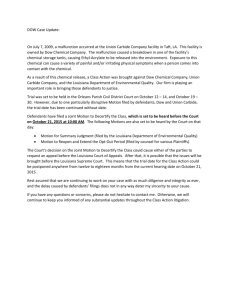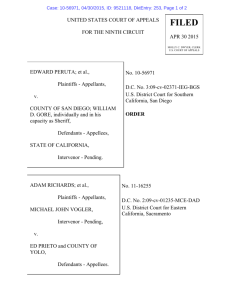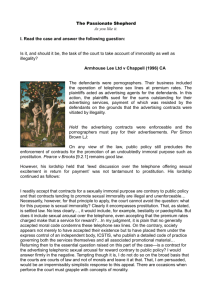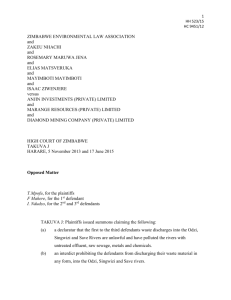Clark v. Universal Builders, Inc. - Ruling on Motions
advertisement
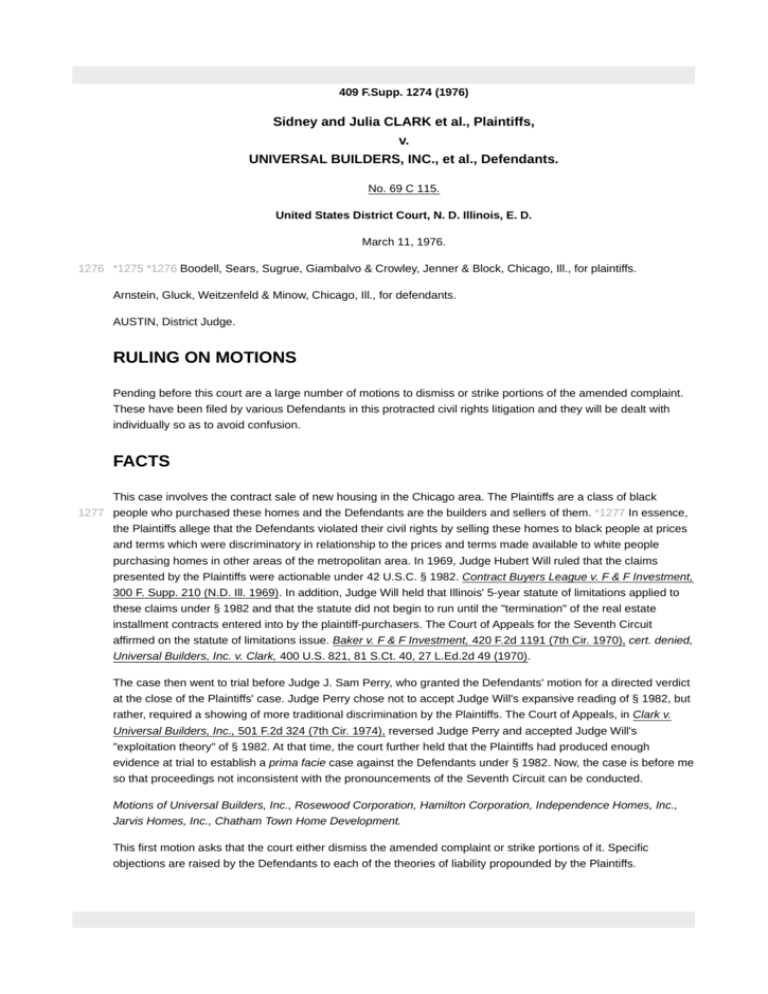
409 F.Supp. 1274 (1976) Sidney and Julia CLARK et al., Plaintiffs, v. UNIVERSAL BUILDERS, INC., et al., Defendants. No. 69 C 115. United States District Court, N. D. Illinois, E. D. March 11, 1976. 1276 *1275 *1276 Boodell, Sears, Sugrue, Giambalvo & Crowley, Jenner & Block, Chicago, Ill., for plaintiffs. 1275 Arnstein, Gluck, Weitzenfeld & Minow, Chicago, Ill., for defendants. AUSTIN, District Judge. RULING ON MOTIONS Pending before this court are a large number of motions to dismiss or strike portions of the amended complaint. These have been filed by various Defendants in this protracted civil rights litigation and they will be dealt with individually so as to avoid confusion. FACTS This case involves the contract sale of new housing in the Chicago area. The Plaintiffs are a class of black 1277 people who purchased these homes and the Defendants are the builders and sellers of them. *1277 In essence, the Plaintiffs allege that the Defendants violated their civil rights by selling these homes to black people at prices and terms which were discriminatory in relationship to the prices and terms made available to white people purchasing homes in other areas of the metropolitan area. In 1969, Judge Hubert Will ruled that the claims presented by the Plaintiffs were actionable under 42 U.S.C. § 1982. Contract Buyers League v. F & F Investment, 300 F. Supp. 210 (N.D. Ill. 1969). In addition, Judge Will held that Illinois' 5-year statute of limitations applied to these claims under § 1982 and that the statute did not begin to run until the "termination" of the real estate installment contracts entered into by the plaintiff-purchasers. The Court of Appeals for the Seventh Circuit affirmed on the statute of limitations issue. Baker v. F & F Investment, 420 F.2d 1191 (7th Cir. 1970), cert. denied, Universal Builders, Inc. v. Clark, 400 U.S. 821, 81 S.Ct. 40, 27 L.Ed.2d 49 (1970). The case then went to trial before Judge J. Sam Perry, who granted the Defendants' motion for a directed verdict at the close of the Plaintiffs' case. Judge Perry chose not to accept Judge Will's expansive reading of § 1982, but rather, required a showing of more traditional discrimination by the Plaintiffs. The Court of Appeals, in Clark v. Universal Builders, Inc., 501 F.2d 324 (7th Cir. 1974), reversed Judge Perry and accepted Judge Will's "exploitation theory" of § 1982. At that time, the court further held that the Plaintiffs had produced enough evidence at trial to establish a prima facie case against the Defendants under § 1982. Now, the case is before me so that proceedings not inconsistent with the pronouncements of the Seventh Circuit can be conducted. Motions of Universal Builders, Inc., Rosewood Corporation, Hamilton Corporation, Independence Homes, Inc., Jarvis Homes, Inc., Chatham Town Home Development. This first motion asks that the court either dismiss the amended complaint or strike portions of it. Specific objections are raised by the Defendants to each of the theories of liability propounded by the Plaintiffs. § 1982 Claims The Defendants urge that the amended complaint fails to set forth any violation of rights guaranteed by 42 U.S.C. § 1982. That statute reads: All citizens of the United States shall have the same right, in every State and Territory, as is enjoyed by white citizens thereof to inherit, purchase, lease, hold, and convey real and personal property. To claim that no § 1982 violation is present in the litigation now before this court is to ignore the 7th Circuit's opinion in Clark; this I cannot do. The Clark opinion established clearly the rule in this Circuit that a cause of action does exist under § 1982 for the type of discrimination which the Plaintiffs claim took place. As a district judge, I do not sit in review of the Court of Appeals; only the Supreme Court of the United States performs that function and it declined the opportunity to review the Clark opinion. (Certiorari was denied in 1974. Clark v. Universal Builders, Inc., 419 U.S. 1070, 95 S.Ct. 657, 42 L.Ed.2d 666 (1974)). Therefore the Defendants' motion to dismiss that portion of the amended complaint pertaining to alleged deprivations of rights guaranteed by 42 U.S.C. § 1982 is denied. These claims are not barred by the Illinois statute of limitations. Again, the Defendants have presented me with the opportunity to sit in review of the Seventh Circuit, but I must decline. In Baker v. F & F Investment, supra, the Court of Appeals clearly held that the statute of limitations did not begin to run at the time of the execution of the contract, but rather, only at the time of the contract termination. Consequently, the Defendants' argument that the statute of limitations bars these claims is without merit. 1278 *1278 § 1981 Claims The Plaintiffs claim that 42 U.S.C. § 1981 was also violated by the conduct of the Defendants. That section provides: "All persons . . . shall have the same right in every State and Territory to make and enforce contracts, . . . and to the full and equal benefit of all laws and proceedings for the security of persons and property as is enjoyed by white citizens . . .. Neither Judge Will nor the Seventh Circuit considered this claim, nor those based upon § 1983 or § 1985(3). Consequently, this court will deal with these issues without guidance from these two sources. Sections 1981 and 1982 have traditionally been construed in a similar fashion. See e.g., Tillman v. WheatonHaven Recreation Assn., Inc., 410 U.S. 431, 93 S.Ct. 1090, 35 L.Ed.2d 403 (1973); McCrary v. Runyon, 515 F.2d 1082 (4th Cir. 1975); Baker v. F & F Investment Company, 489 F.2d 829 (7th Cir. 1973). Furthermore, it is generally recognized that civil rights complaints are to be liberally construed. Conley v. Gibson, 355 U.S. 41, 78 S.Ct. 99, 2 L.Ed.2d 80 (1957). With this background in mind, I believe that the Plaintiffs' claims under § 1981 are viable; therefore, the Defendants' motion to dismiss or strike that portion of the complaint is denied. Construing the complaint in a liberal fashion, as must be done for the purposes of a motion to dismiss, I cannot say that the Plaintiffs will never be able to prove a set of facts which will entitle them to relief under § 1981. The Plaintiffs in this action are alleging not that they were denied the right to contract with others, but rather, that the terms and substance of the contracts they entered into became more onerous simply because of their race. This type of discrimination has been held to state a claim under § 1981. Cody v. Union Electric, 518 F.2d 978 (8th Cir. 1975). § 1985(3) Claims The amended complaint alleges that the Defendants conspired among themselves to deprive the Plaintiffs of equal protection or privileges under the law in violation of 42 U.S.C. § 1985(3). That portion of the Civil Rights Act reads as follows: If two or more persons . . . conspire . . . for the purpose of depriving, either directly or indirectly, any person or class of persons of the equal protection of the laws, or of equal privileges and immunities under the laws; . . . in any case of conspiracy set forth in this section, if one or more persons engaged therein do, or cause to be done, any act in furtherance . . . of such conspiracy, . . . the party so injured or deprived may have an action for the recovery of damages . . . against any one or more of the conspirators. As is obvious, this statute possesses a number of requirements which must be met before liability for damages is imposed. These needs were enumerated in the case of Griffin v. Breckenridge, 403 U.S. 88, at page 102, 91 S.Ct. 1790, at page 1798, 29 L.Ed.2d 338, at page 348 (1971), where the court stated: To come within the legislation, a complaint must allege that the defendants did (1) "conspire . . . (2) for the purpose of depriving . . . any person or class of persons of equal protection of the laws . . .. It must then assert that one or more of the conspirators (3) did . . . "any act in furtherance of the object of [the] conspiracy," whereby another was (4a) injured . . . or (4b) deprived of . . . any right or privilege of a citizen of the United States. The amended complaint alleges, with sufficient detail, facts which, if proven at trial, would show that the Defendants did actually conspire to deprive the Plaintiffs of their civil rights in violation of § 1985(3). This court's 1279 rulings with respect to § 1982 and § 1981 plainly indicate that there may possibly have been *1279 violations of rights guaranteed by these statutes. If a conspiracy is involved in the deprivation of these rights, § 1985(3) swings into play. The Defendants argue vigorously that the element of conspiracy is not established in this situation due to the fact that the Plaintiffs claim that the Defendants were joint venturers. Citing cases such as Dombrowski v. Dowling, 459 F.2d 190 (7th Cir. 1972), the Defendants urge that these entities cannot conspire between themselves as a matter of law. However, I believe that Dombrowski and the other cases referred to by the Defendants are distinguishable from the case at bar; they all dealt with a single corporate entity allegedly conspiring with one of its own agents, whereas the Defendants before this court are many in number and distinct and separate from each other. It is true that a single corporation or a partnership cannot usually conspire with its own agents but the situation here is fundamentally different from that present in those cases which are cited by the Defendant. I have before me corporate builders of homes working with both individuals and corporate sellers of homes and it cannot be said that these two types of entities and the individuals they employ can never be guilty of conspiracy as a matter of law. Therefore, I conclude that all of the elements necessary for an action under 42 U.S.C. § 1985(3) are present in the Plaintiffs' amended complaint. The Defendants' motion to dismiss those portions of the complaint dealing with § 1985(3) is denied. 14th Amendment and § 1983 Claims In their briefs, the Plaintiffs concede that they do not state a claim under 42 U.S.C. § 1983. See generally Moose Lodge No. 7 v. Irvis, 407 U.S. 163, 92 S.Ct. 1965, 32 L.Ed.2d 627 (1972); Monroe v. Pape, 365 U.S. 167, 81 S.Ct. 473, 5 L.Ed.2d 492 (1961). Because there is definitely a lack of state action in the present case, the Defendants' motion to dismiss those portions of the complaint dealing with § 1983 is granted. Also, because the Fourteenth Amendment requires some activity by the state or one acting under color of its law, there can be no valid claim made independently under the Fourteenth Amendment. See e.g., District of Columbia v. Carter, 409 U.S. 418, 93 S.Ct. 602, 34 L.Ed.2d 613 (1973). 13th Amendment Claims The Defendants claim that no independent cause of action exists under the Thirteenth Amendment and I must agree with this position. However, it must be noted that the Thirteenth Amendment is read in conjunction with those statutes which implement it. The Defendants in their briefs concede that 42 U.S.C. § 1982 is an exercise of the power granted to the Congress by this Amendment. The Seventh Circuit, in Clark v. Universal Builders, Inc., supra, held that § 1982, coupled with the Thirteenth Amendment, did state a claim upon which relief could be based. Therefore, as earlier portions of this opinion indicate, the amended complaint does state a valid cause of action upon the statutory grounds enumerated above. But paragraph 14(a) of the amended complaint, which purports to base a claim solely upon the Thirteenth Amendment, must be stricken. That Amendment simply does not operate in such a manner as to allow an action without implementing statutes such as the Civil Rights Act of 1866. See generally, Flood v. Kuhn, 316 F.Supp. 271 (S.D.N. Y.1970), aff'd, 443 F.2d 264 (2d Cir. 1971). Claims Alleging Fraud, Unconscionability and Usury In 1969, Judge Will held that those portions of the Plaintiffs' complaint dealing with fraud, unconscionability and usury failed to state a claim upon which relief could be granted. Contract Buyers League v. F & F Investment, 300 1280 F.Supp. 210 at 225-228 (N.D.Ill.1969). That portion of Judge Will's decision *1280 dealing with these three issues was never appealed and even the Plaintiffs concede that they have "abandoned" this portion of the original complaint. The Defendants are now requesting that those paragraphs dealing with these issues be stricken. This was not requested of Judge Will back in 1969 and the Defendants now state that it must be assumed that Judge Will would have granted such a motion to strike if it was made back in 1969. I do not believe that any assumption like this can be made. The Plaintiffs state that none of these allegations purport to state a separate claim; rather, they urge that these are simply facts which the Plaintiffs wish to try to prove in support of their basic claims. I agree; these facts, if proven, will tend to support the basic claims which the Plaintiffs assert under the various sections of the Civil Rights Act of 1866. Therefore, these allegations of the amended complaint pertaining to fraud, unconscionability, and usury will not be stricken. Furthermore, the Defendants' motion to strike those portions of the amended complaint contained in paragraphs 7(a) through 7(g), 11, 12(a), 12(d), 12(i), 15(a), 15(b), 15(e), 15(f), 15(i) and 15(g) will be denied for the reasons stated above. Summary The Defendants' motion to dismiss the amended complaint is denied. The Defendants' motion to strike portions of the amended complaint, taken as motions to dismiss for failure to state a claim upon which relief is based, are denied as pertaining to the § 1982 claims, the § 1981 claims and the § 1985(3) claims. The motion to strike is granted as to the § 1983 claims and those concerned with the Thirteenth and Fourteenth Amendments. Those sections of the amended complaint alleging fraud, usury, and unconscionability are not stricken nor are those various paragraphs enumerated above. Motions of Richard Samuels, William Samuels, Reva Paul, Lee L. Turoff and the South City Home Development Company These Defendants have filed motions to dismiss or strike portions of the amended complaint which pertain to them. Reva Paul, Richard Samuels and William Samuels were alleged to be officers and directors of Defendant land companies, which sold the residences actually constructed by Defendant Universal Builders. Defendant South City Home Development Company is one of these land companies. Motion of Individual Defendants The Plaintiffs claim that these four individual Defendants aided and conspired with the corporate Defendants in the deprivation of the civil rights of the Plaintiffs. It is further alleged that Universal and the land companies were mere "devices" utilized by the individual Defendants to carry on illegal activities and that the corporation had no legitimate existence or interests separate from those of the individual Defendants. These Defendants are asking the court to dismiss or strike certain paragraphs of the complaint pursuant to Rule 12 of the Federal Rules of Civil Procedure. To meet this objective, Reva Paul, Richard Samuels and William Samuels filed affidavits in support of their motions. Therefore, pursuant to Rule 12(b), this court will consider the motions of these Defendants as Rule 56 motions for summary judgment. I do not believe that Reva Paul, Richard Samuels and William Samuels are entitled to judgment as a matter of law; genuine issues of material fact remain to be resolved. Evidence submitted by Reva Paul, Richard Samuels and William Samuels is in conflict with other evidence already in the record. This creates questions of fact which must be resolved at trial; I cannot do so upon a motion for summary judgment. 1281 The individual Defendants urge that they cannot be held liable for any *1281 violations of the Plaintiffs' civil rights, as a matter of law, because any violations were caused by the corporations, and not the individuals themselves. Earlier sections of this memorandum opinion have held that there is a potentially valid claim under several sections of the Civil Rights Act of 1866. The Seventh Circuit, in Clark v. Universal Builders, Inc., supra, dealt specifically with the issue of the liability of the individual Defendants for "corporate" actions. That court refused to allow the use of corporate entity as a shield by the individual Defendants. Earlier precedent, such as Ohio Tank Car Co. v. Keith Ry. Equipment Co., 148 F.2d 4 (7th Cir.) cert. denied, 326 U.S. 730, 66 S.Ct. 38, 90 L.Ed. 434 (1945), required an exceptional circumstance in order to justify the disregard of the corporate identity. The court stated at page 6: The general rule that a corporation and its stockholders are deemed separate entities is subject to the qualification that the separate identity may be disregarded in exceptional situations where it otherwise would present an obstacle to the due protection or enforcement of public or private rights. Following this quotation, the Clark court held that the instant situation was exceptional enough to warrant the application of the exception to the general rule. The concept of separate identity between shareholders and their corporations is not sacrosanct. It demands even lesser respect when it becomes clear that the corporation is used as a vehicle to violate the civil rights of others. The instant action is an "exceptional situation" sufficient to justify disregard of the corporate identities . . .. Clark v. Universal Builders, Inc., supra at 340, n. 23. It is impossible for the individual Defendants to avoid the impact of this ruling. Nevertheless, they attempt to do so by arguing that they will be deprived of due process of law if these statements by the Seventh Circuit are viewed as controlling. This argument lacks merit. Although the individual Defendants were not formal parties to this lawsuit at the time the Court of Appeals ruled in Clark, the corporate Defendants' briefs spoke directly to this issue in both the Court of Appeals and the Supreme Court. These corporations were closely held and the individual Defendants played key roles in their operation; even the Clark court noted that these individuals were on "constructive notice of the action and indeed were active participants in it since its inception." Clark v. Universal Builders, Inc., supra at 340. Under these circumstances, the individual Defendants cannot claim that they were never given an opportunity to be heard on this issue. The individual Defendants make two further arguments in favor of their motion. First, they urge that, as a matter of law, these people could not conspire with the other Defendants. As mentioned earlier, I do not feel that conspiracy is a legal impossibility in the case at bar. The fact remains that these people may have conspired among each other and the corporate Defendants. Second, the Defendants claim that the applicable statute of limitation bars the claims against the individual Defendants. I believe that this issue was dealt with adequately in Baker v. F & F Investment, supra, as well as in my own discussion, so I will not belabor the issue here except to state that the statute of limitations is no bar to these claims. The Baker case is applicable to the individual, as well as the corporate, Defendants. Since the amended complaint is not insufficient as a matter of law, the motions of Reva Paul, Richard Samuels, and William Samuels are denied. The motion of Defendant Lee L. Turoff to dismiss or strike is also denied. Turoff did not submit any affidavit in support of his motion but, rather, he simply adopted the legal arguments of the other individual Defendants. Consequently, his motion must also be denied. 1282 *1282 Motion of South City Home Development Company South City, one of the Defendant-land companies, is requesting that this court grant its motion to dismiss or strike those portions of the complaint which pertain to it. As its basic premise, South City asserts that the Plaintiffs lack standing to sue it because none of named Plaintiffs ever purchased a home from this Defendant. Again, an affidavit to this effect was submitted by an officer of the moving party. This Defendant is alleged to have been a joint venturer with Universal Builders, Inc., who constructed the dwellings. The other land companies actually sold the homes to the buyer-Plaintiffs, while the uncontradicted affidavit of Richard Samuels indicates that no Plaintiff ever purchased a home from South City. No disputed issue of fact exists here. The Plaintiff-purchasers had contact with Universal Builders who was a joint venturer with the many land companies, including South City, but none of the Plaintiffs ever purchased a dwelling from South City itself. Because of the common ownership and management present in all of these various corporations, the Plaintiffs ask that corporate formalities not be adhered to at all in this situation. While I agree that corporate formalities need not be rigidly adhered to when inquiry is made of civil rights violations, I do not believe that they should be totally and completely ignored, as the Plaintiffs would have me do in order to allow them to bring an action against this particular Defendant. The general rule is that one cannot sue for the deprivation of another person's rights. See e. g., U. S. v. Biloxi Municipal School Dist., 219 F.Supp. 691 (S.D. Miss.1963), aff'd, 326 F.2d 237 (5th Cir. 1964), cert. denied sub nom. U. S. v. Madison County Board of Education, 379 U.S. 929, 85 S.Ct. 324, 13 L.Ed.2d 341 (1964). In the case at bar, the Plaintiffs are attempting to assert the constitutional rights of others who purchased homes from South City in contravention of this rule. This cannot be done under the circumstances; the Plaintiffs lack standing to assert these rights. Therefore, Defendant South City Home Development Company's motion to strike or dismiss, taken as a Rule 56 motion for summary judgment, is granted. Motion of the Estate of Albert Samuels Albert Samuels was a director, officer, and shareholder of the Defendant land companies. The record further indicates that he may have been one of the key men in this entire corporate structure. Samuels died in June of 1971 and in June of 1975, the estate was named as an additional party in the amended complaint. Samuels' estate is now moving for an order of dismissal because of the fact that a claim was not filed against the estate until June of 1975. In determining the soundness of this motion to dismiss, chronology becomes crucial because an Illinois statute requires that claims against the estate be filed within seven months of the issuance of letters testamentary. Ill.Rev. Stat. Chap. 3 § 204 (1971). Within the seven month period, on December 1, 1971, the Plaintiffs moved for leave to amend their complaint so as to add, among others, the estate of Albert Samuels. Judge Perry denied this motion but the Seventh Circuit reversed this decision on July 26, 1974. Clark v. Universal Builders, Inc., supra, at 339-40. The Defendants' petition for a writ of certiorari was denied on December 16, 1974. Clark v. Universal Builders, Inc., 419 U.S. 1070, 95 S.Ct. 657, 42 L.Ed.2d 666 (1974). Finally, on June 18, 1975, the Plaintiffs' motion for leave to file an amended complaint, which added the estate of Albert Samuels as a Defendant, was granted. The estate's executor was served with a copy of the amended complaint on July 30, 1975. The basic question before the court in this motion is whether the Plaintiffs were timely in their filing of the claim 1283 against the estate. I believe that under the peculiar situation present *1283 in this litigation, the Plaintiffs did act in a timely fashion. I cannot punish the Plaintiffs for an error made by the judge who improperly denied them leave to file the amended complaint. To do so would be grossly unfair; if this error was not made back in 1971, there would be no problem here today, for it is obvious that the Plaintiffs attempted to file their claim well within the statutory time period. Were it not for this error by the trial court they would have been successful in meeting the requirements of the Illinois statute. The Plaintiffs pursued their action properly in this court and there is no question that a federal court possesses jurisdiction over a civil rights claim where a Defendant is deceased. See e. g., Pritchard v. Smith, 289 F.2d 153 (8th Cir. 1961). The plaintiffs here were unable to affect proper service upon the estate's executor only because leave to amend the complaint was improperly denied. Consequently, justice demands that I deny the motion of the estate of Albert Samuels to dismiss that portion of the complaint pertaining to the estate. The Plaintiffs' motion to substitute Leah Samuels, the executor of the Albert Samuels estate, is granted pursuant to Rule 25(a)(1) of the Federal Rules of Civil Procedure. See generally 3B Moore, Federal Practice § 25.06[3]. CONCLUSION The motions of the Defendants Universal, Rosewood, Hamilton, Independence, Jarvis and Chatham to dismiss the complaint are denied. The motions of these parties to strike portions of the amended complaint are granted in part and denied in part, as indicated above. The motions of Richard and William Samuels, Reva Paul and Lee Turoff to dismiss or strike are denied. Defendant South City's motion to dismiss is granted. Finally, the motion of the estate of Albert Samuels to dismiss is denied. It is so ordered. Save trees - read court opinions online on Google Scholar.
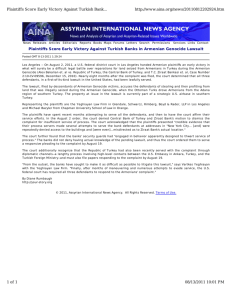
![[Click and Enter Attorney Name], State Bar No - E](http://s3.studylib.net/store/data/007177564_1-4d9407aff5e1ecb2a5922cd955484ee2-300x300.png)
